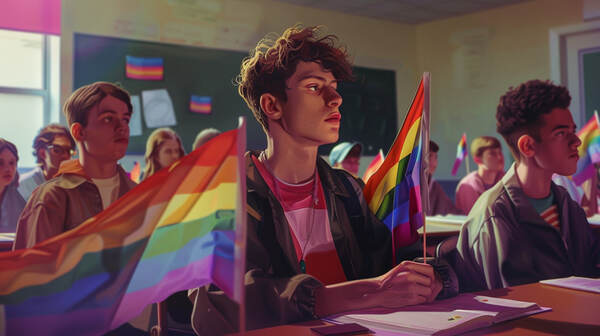The state of Washington has announced plans to make LGBTQ history mandatory in all public school curriculums by 2025, prompting discussions about its impact on students. This decision has raised concerns about prioritizing this topic over other essential subjects vital for students’ intellectual and academic development.
The articulated aim is to “foster inclusive learning standards and instructional materials in public schools,” with the law stipulating that LGBTQ history must be incorporated into the learning standards developed by the state by the specified deadline.
According to the law, the learning model “must mandate that the school board of directors, within available resources, adopt inclusive curricula and select diverse, equitable, inclusive, age-appropriate instructional materials that encompass the histories, contributions, and viewpoints of historically marginalized and underrepresented groups, including but not limited to, individuals from various racial, ethnic, and religious backgrounds, LGBTQ individuals, and those from diverse socioeconomic and immigration backgrounds.”

Libby Emmons (Credits: X)
Furthermore, it’s not solely about including these topics in the curriculum; it’s also about employing inclusive practices in selecting the curriculum itself.
The law specifies, “The model must mandate that, in adopting curricula and selecting instructional materials,” school boards should seek out curricula and instructional materials that are as culturally and experientially diverse as possible, recognizing the variability in the availability of materials covering the histories, contributions, and perspectives of historically marginalized and underrepresented groups.
While the Democrats driving this initiative in Washington State may believe they’re advancing a just and compassionate cause by ensuring students in the state are familiar with scenarios such as men using women’s gym locker rooms or individuals undergoing gender transition, many parents contend that the repercussions of futile education are far more perilous than merely encountering disagreeable ideas.
Contrary ideas can be challenged—and indeed must be challenged—and parents must remain vigilant. However, ineffective education is insidious and enduring. When ideology supersedes skill and competence, when fundamental skills like reading, writing, understanding cultural context, and history take a backseat to other agendas, students graduate from school lacking substantial knowledge.
To be explicit, it’s not merely about adding these ideas; it’s also about subtracting others. When the history of LGBTQ individuals and activism assumes prominence, the foundational history of America’s establishment, literature, and possibly other subjects could be marginalized or eliminated altogether.
This is precisely what’s happening—a substitution of teachings on the foundational history of our nation with the histories of marginalized groups. Consequently, there’s a form of erasure transpiring. Instead of possessing a fundamental comprehension of national culture, students will be well-versed in topics such as the legalization of same-sex marriage, the legacy of figures like Harvey Milk, and concepts like gender euphoria.

These students might excel at conjugating pronouns for non-binary individuals who identify as owls, but will they possess the broader skills necessary for knowledge acquisition? Will they be equipped with the tools to learn independently? Will they understand how to research, analyze, innovate, make informed decisions, and thrive as competent adults in the United States?
If there’s one lesson we’ve gleaned from the recent disruptions in education due to the pandemic—school closures, lockdowns, and remote learning—it’s that children deprived of proper education struggle both academically and personally. They become despondent, isolated, feel worthless, and struggle to articulate why.
Mathematics? English? History? Music? Art? Practical skills like woodworking or cooking? All seemingly trivial to those committed to the pursuit of diversity, equity, and inclusion, who emphasize the importance of teaching anti-racism or the fluidity of gender.
They appear indifferent to whether students possess competencies, skills, or the capacity to function in society; their primary concern is instilling what amounts to a quasi-religious belief system that prioritizes everything but excellence, merit, and competence.
It matters little to these left-leaning ideologues that their previous endeavors—like transitioning to remote learning during the pandemic—yielded disastrous results, leaving a substantial portion of American students barely literate, numerically challenged, overweight, socially inept, and devoid of any sense of future direction.
They seem unfazed by the suffering endured by these children, the lost years of education and socialization, and the Herculean task of catching up that lies ahead, even with parents’ valiant efforts to provide support.
Despite vehement opposition to such initiatives, proponents of these programs—Democrats, progressives, activists, leftists, and establishment figures—persist in their pursuits, dragging our children along a misguided path toward a dystopian future.
Parents consistently raise their voices, often joined by teachers, clamoring for a return to a proper education—one that equips students with tools and teaches them how to utilize them effectively, one that empowers children to assume leadership roles in the nation when their time arrives.
Again and again, political parties, lawmakers, media, educators, and institutions ignore these pleas. Parents and students are left alone in a schooling system that doesn’t meet their needs, forced to accept curricula that set them up for failure.
Washington State serves as just one example among many entities that prioritize ideological virtue signaling over the well-being and future prospects of our children. By the time the repercussions of these failures become apparent, it will likely be too late for these students and their parents to rectify the damage inflicted.























